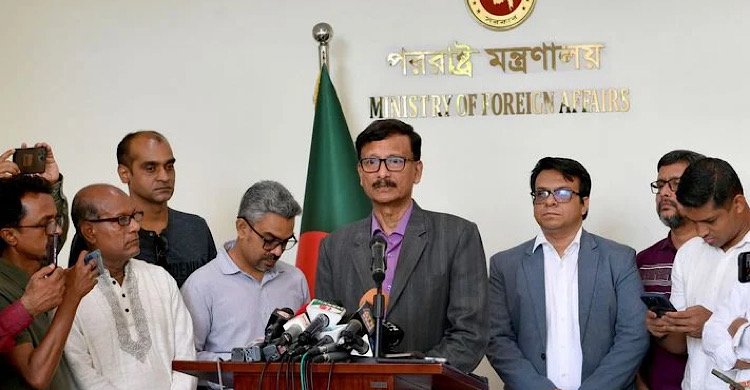Hasina’s extradition raised during Yunus-Modi meeting: Touhid


Foreign Affairs Adviser Md Touhid Hossain today said Chief Adviser Dr Muhammad Yunus raised the issue of ousted Sheikh Hasina’s extradition during a meeting with Indian premier Narendra Modi in Bangkok, though no final decision was reached.
“We raised the issue, but nothing was finalized,” he told reporters at the foreign ministry declining to elaborate further when asked for details.
The Chief Adviser recently concluded his first bilateral visit to China and subsequently attended the 6th BIMSTEC Summit in Thailand, where he held his maiden bilateral meeting with Prime Minister Modi on the sidelines of the summit.
The Foreign Adviser said both visits—to China and to Thailand— had by and large fulfilled Bangladesh’s expectations.
He emphasized that progress in Dhaka-Delhi relations requires efforts from both sides. “We need to move forward together,” Hossain said.
Following the Yunus-Modi meeting in Bangkok, Indian Foreign Secretary Vikram Misri told reporters that Prime Minister Modi had urged all parties to refrain from rhetoric that could damage the atmosphere of bilateral engagement.
In response, Adviser Hossain acknowledged that both sides shared this sentiment. “The same kinds of statements are also coming from our side,” he remarked.
During the talks, Prime Minister Modi reaffirmed India’s support for a “democratic, stable, peaceful, progressive and inclusive” Bangladesh.
Foreign Adviser Hossain reiterated the interim government's commitment to transferring power to an elected leadership through a free and fair election. “Bangladesh’s friends always raise the issue of elections,” he said.
“Whenever the subject comes up in discussions, they express concern, even countries without democratic traditions often inquire about our elections,” he added.
On the issue of Indian visas, the adviser said whether India issues visas or not is entirely their sovereign decision. “We have also temporarily suspended visa issuance to India in the past,” he noted.
He said visa restrictions do not create a vacuum. “When any country suspends visas, people tend to explore alternatives elsewhere,” he added.
Asked about the Teesta River Management Project involving China, Hossain said Bangladesh remains open to cooperation with both India and China.
“The government has taken a liberal stance. We are open to discussing the project with both sides and will evaluate where Bangladesh’s interests are best served,” he said.
Commenting on the progress following the Bangladesh government’s welcome of a Chinese company's involvement in the Teesta project, he noted, “Progress takes time. We are not expecting an overnight solution that will resolve the Teesta issue immediately.”
“Cooperation is possible with either country (India or China). There are no obstacles,” he reiterated.
About the China visit, Hossain said engagement at the highest level had yielded some progress. “When top-level communication is in place, it facilitates the advancement of relationships at other levels,” he added.
He said several documents were signed during the visit and the Chief Adviser and Chinese President discussed mutual interests. “I believe the visit has had a reasonably positive impact,” he added.
Regarding the Rohingya issue, the adviser said Myanmar has confirmed that 180,000 forcibly displaced Myanmar nationals are eligible for repatriation. However, he clarified that an immediate return is unlikely due to the prevailing conditions in Rakhine State.
Commenting on protests by Bangladeshi nationals over delays in obtaining Italian visas, Hossain said Dhaka is in continuous dialogue with Rome.
“There are questions concerning the authenticity of the documents submitted with visa applications. A large number of fake documents have been detected,” he said.
Italian authorities are currently verifying the genuineness of submitted documents, and as a result, even applicants with legitimate paperwork are experiencing delays and complications, the adviser added.
